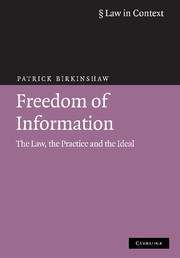Book contents
- Frontmatter
- Contents
- Preface
- Table of statutes
- Table of cases
- Introduction
- 1 Persistent themes and novel problems
- 2 Information and national security
- 3 Government and information: a historical development
- 4 The Freedom of Information Act 2000
- 5 The exemptions
- 6 Decisions and Appeals on FOI Exemptions
- 7 Access to environmental information
- 8 Privacy, access and data protection
- 9 Claims and counterclaims
- 10 Secrecy and access in the European Union
- 11 Openness, information and the courts
- 12 Freedom of information: overseas experience
- 13 Conclusion
- Index
3 - Government and information: a historical development
Published online by Cambridge University Press: 05 June 2012
- Frontmatter
- Contents
- Preface
- Table of statutes
- Table of cases
- Introduction
- 1 Persistent themes and novel problems
- 2 Information and national security
- 3 Government and information: a historical development
- 4 The Freedom of Information Act 2000
- 5 The exemptions
- 6 Decisions and Appeals on FOI Exemptions
- 7 Access to environmental information
- 8 Privacy, access and data protection
- 9 Claims and counterclaims
- 10 Secrecy and access in the European Union
- 11 Openness, information and the courts
- 12 Freedom of information: overseas experience
- 13 Conclusion
- Index
Summary
Government control of information in Britain did not first emerge as a problem for government in 1889, when the first Official Secrets Act was passed. Control of information had been a central preoccupation of government since government first assumed responsibility for defence, taxation and administration, and even before. The King's household, until the Tudor monarchy, was characterised by personal government on the advice of trusted counsellors who remained bound by allegiance and confidence to the Crown. Serious breaches of confidence might involve a charge of treason in the form of adhering to the King's enemies under the Act of 1351, which was extended well beyond the terms of the statute by judicial decisions. High treason ‘was regarded as a final denial of the divine order of things as established in the body politic and defined in the oath of allegiance’.
Breaches of confidence were not always problematic in the absence of widespread printing and publishing facilities. More pressing for the power in existence was the control of the spread of seditious ideas or movements which could threaten its position. This point is vividly illustrated by the breach with the Church of Rome and the accumulation of statutes extending treason to punish inter alios those who:
shall by writing, printing, preaching, speech, express words or sayings, maliciously, advisedly and directly publish, set forth, and affirm that the Queen our said sovereign lady Queen Elizabeth is an heretic, schismatic, tyrant, infidel or an usurper of the Crown of the said realms or any of them …
- Type
- Chapter
- Information
- Freedom of InformationThe Law, the Practice and the Ideal, pp. 69 - 117Publisher: Cambridge University PressPrint publication year: 2010



